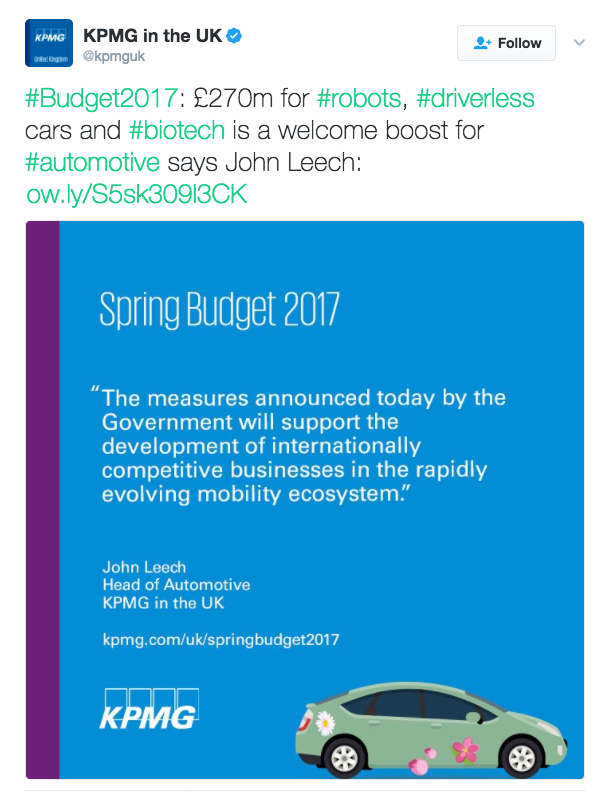
Robohub.org
Reactions from experts: Robotics and tech to receive funding boost from UK government

Yesterday, the UK government announced their budget plans to invest in robotics, artificial intelligence, driverless cars, and faster broadband. The spending commitments include:
- £16m to create a 5G hub to trial the forthcoming mobile data technology. In particular, the government wants there to better mobile network coverage over the country’s roads and railway lines
- £200m to support local “full-fibre” broadband network projects that are designed to bring in further private sector investment
- £270m towards disruptive technologies to put the UK “at the forefront” including cutting-edge artificial intelligence and robotics systems that will operate in extreme and hazardous environments, including off-shore energy, nuclear energy, space and deep mining; batteries for the next generation of electric vehicles; and biotech.
- Investing £300 million to further develop the UK’s research talent, including through creating an additional 1,000 PhD places.
The entire budget can be reviewed here.
Several experts in the robotics community agree that progress is shifting in the right direction, however, more needs to happen if the UK is to remain competitive in the robotics sector:
Prof Paul Newman, Founder, Oxbotica:
“The UK understand the very real positive impact that RAS [robotics & autonomous systems] will have on our society from now, of all time. It continues to see the big picture and today’s announcement by the Chancellor is a clear indication of that. We can have better roads, cleaner cities, healthier oceans and bodies, safer skies, deeper mines, better jobs and more opportunity. That’s what machines are for.”
Dr Graeme Smith, CEO, Oxbotica:
“We are at a real inflection point in the development of autonomous technology. The UK has a number of nascent world class companies in the area of self-driving vehicles, which have a huge potential to change the world, whilst creating jobs and producing exportable UK goods and services. We have a head start and now we need to take advantage of it.” [from FT]
Dominic Keen, Founder of Britbots:
“Some of the great robotics companies of the future are being launched by British entrepreneurs and the support announced in today’s budget will to strengthen their impact and global competitiveness. We’re currently seeing strong appetite from private investors to back locally-grown robotics businesses and this money will help bring even more interest in this space”
Dr Rob Buckingham, Director of the UK Atomic Energy Authority’s RACE robotics centre:
“This is welcome news for the many research organisations developing robotics applications. As a leading UK robotics research group specialising in extreme and challenging environments, we welcome the allocation of significant funding in this field as part of the Government’s evolving Industrial Strategy. RACE and the rest of the robotics R&D sector are looking forward to working with industry to fully utilise this funding.”
Dr Sabine Hauert, University of Bristol:
“Robotics and AI is set to be a driving force in increasing productivity, but also in solving societal and environmental challenges. It’s opening new frontiers in off-shore and nuclear energy, space and deep mining. Investment from government will be key in helping the UK stay at the forefront of this field.” [from BBC]
Prof Noel Sharkey, University of Sheffield:
“We lost our best machine learning group to Amazon just recently. The money means there will be more resources for universities, which may help them retain their staff. But it’s not nearly enough for all of the disruptive technologies being developed in the UK. The government says it want this to be the leading robotics country in the world, but Google and others are spending far more, so it’s ultimately chicken feed by comparison.” [from BBC]
Prof Alan Winfield, UWE Bristol:
“I’m pleased by the additional funding, and, in fact, my group is a partner in a new £4.6M EPSRC grant to develop robots for nuclear decommissioning announced last week.
But having just returned from Tokyo (from AI in Asia: AI for Social Good), I’m well aware that other countries are investing much more heavily than the UK. China was for instance described as an emerging powerhouse of AI. A number of colleagues at that meeting also made the same point as Noel, that universities are haemorrhaging star AI/robotics academics to multi-national companies with very deep pockets.”
Michael Szollosy, Research Fellow at Sheffield Centre for Robotics, Dept of Psychology:
“I, like many others, was pleased to hear more money going into robotics and AI research, but I was disappointed – though completely unsurprised – to see nothing about how to restructure the economy to deal with the consequences of increasing research into and use of robots and AI. Hammond’s blunder on the relationship of productivity to wages – and it can’t be seen as anything other than a blunder – means that he doesn’t even seem to appreciate that there is a problem.
The truth is that increased automation means fewer jobs and lower wages and this needs to be addressed with some concrete measures. There will be benefits to society with increased automation, but we need to start thinking now (and taking action now) to ensure that those benefits aren’t solely economic gain for the already-wealthy. The ‘robot dividend’ needs to be shared across society, as it can have far-reaching consequences beyond economics: improving our quality of life, our standard of living, education, health and accessibility.”
Frank Tobe, Editor at The Robot Report:
“America has the American Manufacturing Initiative which, in 2015, was expanded to establish Fraunhofer-like research facilities around the US (on university campuses) that focus on particular aspects of the science of manufacturing.
Robotics were given $50 million of the $500 million for the initiative and one of the research facilities was to focus on robotics. Under the initiative, efforts from the SBIR, NSF, NASA and DoD/DARPA were to be coordinated in their disbursement of fundings for science in robotics. None of these fundings comes anywhere close to the coordinated funding programs and P-P-Ps found in the EU, Korea and Japan, nor the top-down incentivized directives of China’s 5-year plans. Essentially American robotic funding is (and has been) predominantly entrepreneurial with token support from the government.
In the new Trump Administration, there is no indication of any direction nor continuation (funding) of what little existing programs we have. At a NY Times editorial board sit-down with Trump after his election, he was quoted as saying that “Robotics is becoming very big and we’re going to do that. We’re going to have more factories. We can’t lose 70,000 factories. Just can’t do it. We’re going to start making things.” Thus far there is no followup to those statements nor has Trump hired replacements for the top executives at the Office of Science and Technology Policy, all of which are presently vacant.”
And finally, a few comments from the business sector on Twitter:


tags: c-Business-Finance





